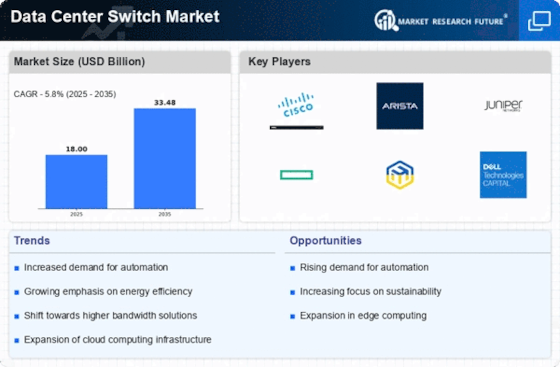Market Share
Data Center Switch Market Share Analysis
In the fiercely competitive realm of the Data Center Switch Market, market share positioning strategies play a pivotal role in determining the success of companies. One prevalent strategy is differentiation, where companies strive to distinguish their products from competitors through unique features, performance capabilities, or innovative designs. By offering a distinct value proposition, a company can carve out a niche in the market, attracting customers looking for specific attributes that set their data center switches apart. This strategy not only helps in customer retention but also aids in building a loyal customer base.
Another key market positioning strategy is cost leadership. Companies adopting this approach focus on becoming the low-cost provider within the market, aiming to attract price-sensitive customers. By optimizing production processes, managing costs efficiently, and achieving economies of scale, these companies can offer competitive pricing for their data center switches. Cost leadership is particularly effective in markets where price sensitivity is high, and customers prioritize affordability over additional features.
Market segmentation is a strategy employed by companies to target specific customer segments with tailored offerings. By understanding the diverse needs and preferences of different customer groups, companies can develop specialized data center switches that cater to distinct market segments. This approach allows businesses to address the unique requirements of various industries, such as healthcare, finance, or telecommunications, and position their products as specialized solutions tailored to specific use cases.
Strategic partnerships and collaborations also play a crucial role in market share positioning within the Data Center Switch Market. Companies often form alliances with technology partners, software developers, or even other hardware manufacturers to create integrated solutions. By combining forces, companies can offer comprehensive data center solutions that seamlessly integrate with various technologies, enhancing the overall value proposition for customers. These partnerships can provide a competitive edge by expanding the range of services offered and improving interoperability.
Customer-focused strategies, such as excellent customer support and after-sales services, contribute significantly to market share positioning. Companies that prioritize customer satisfaction and responsiveness can build strong relationships with clients. This approach not only aids in customer retention but also promotes positive word-of-mouth, which is crucial in a market where reputation and trust play a significant role. Offering robust technical support, regular updates, and responsive communication channels can set a company apart in the highly competitive Data Center Switch Market.
Innovation is a cornerstone of market share positioning strategies in the Data Center Switch Market. Companies that invest heavily in research and development to stay at the forefront of technological advancements can introduce cutting-edge products. Innovations such as faster data transfer speeds, enhanced security features, and energy-efficient designs can capture the attention of tech-savvy customers. Staying ahead of the curve in terms of technology ensures that a company's products remain relevant and sought after in a rapidly evolving market.
Geographical expansion is another strategy used by companies to increase their market share. By entering new markets or expanding their presence in existing ones, companies can tap into a broader customer base. This strategy requires a keen understanding of regional preferences, regulatory environments, and competitive landscapes. Successful geographical expansion allows companies to diversify their customer base and mitigate risks associated with dependence on a single market.

















Leave a Comment